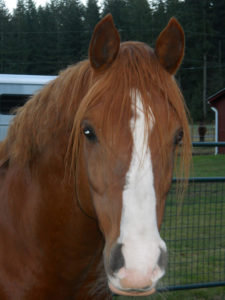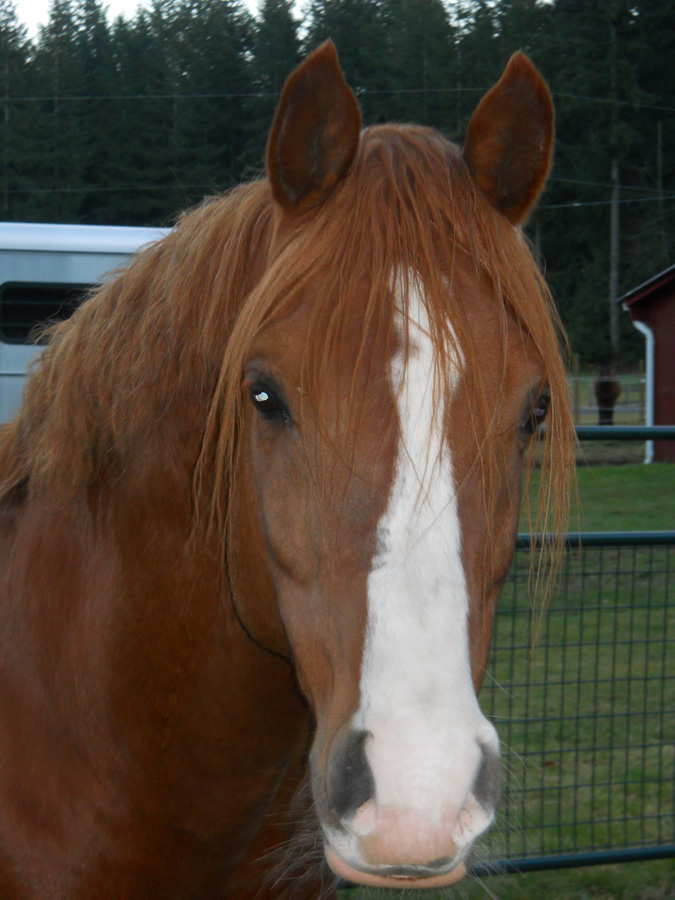Protect Your Horse from Four Serious Diseases
by Eleanor Blazer

Within your horse may be invaders that can cause illness. These organisms are dependent on him for sustenance and life. Your horse is their “host.” Examples of these unwanted guests are intestinal parasites, bacterial or viral infection. Many of these ailments can be passed from horse to horse.
Your horse can also be a dead-end host. This means the invader cannot be passed to another host. The lifecycle of the organism is not completed, but is still dangerous enough to cause sickness or death to the supporting host. Equine protozoal myeloencephalitis (EPM), the West Nile virus, Lyme disease and lungworms are examples of invaders that reach the end of the line if they infect a horse.
The protozoa that causes equine protozoal myeloencephalitis (EPM) is a single-celled parasite that is passed to the horse when he consumes feed or water contaminated with infected opossum feces. Within the horse the sporocysts (parasite larva) travel from the digestive system into the blood stream and attack the nervous system. Symptoms of EPM are vague: uncoordinated movement, unexplained random lameness that comes and goes, weakness in the hindquarters, carrying the tail off to one side and problems balancing when one leg is lifted. These can all be clues. Horse owners are urged to learn what is normal for their horse, so when something is “off” it can be spotted and a veterinarian consulted. This is true of any illness.
The best prevention regarding EPM is to keep feed and water free of opossum feces. According to the American Association of Equine Practitioners the EPM vaccine has not proved to be reliable.
The West Nile virus is spread by mosquitoes that feed on infected birds. Mosquitoes also spread the virus to other mammals including the horse and humans. These hosts do not develop high levels of virus in their bloodstream, and the virus cannot be transferred further. Symptoms of the West Nile virus in a horse are depression, weakness of the legs, twitching muscles, not being able to stand, elevated temperature, depressed appetite and fever. These signs can also be symptoms of other diseases, so your veterinarian will conduct a blood test. There is a vaccination to help prevent West Nile in horses.
Lyme disease is an illness caused by bacteria that is transmitted by the tiny blacklegged deer tick. (Wood and dog ticks do not spread the bacteria.) The deer tick feeds on an animal (rodent or bird) that is a reservoir for the bacteria. When the infected tick feeds on the next animal it transmits the bacteria to a new host. Horses, dogs and humans are dead-end hosts.
Symptoms of Lyme disease in horses include low-grade fever, stiffness, lameness, general muscle soreness, sensitivity to touch, changes in attitude and neurological signs such as head tilt. Your veterinarian has several tests that can help diagnose the illness. Because it is a bacterial infection, antibiotics can be used to fight the disease. There is no viable vaccination on the market at this time to prevent Lyme disease. The best prevention is to avoid areas where the deer tick is known, and inspect and remove the tick from horses (the tick must be attached to the horse for 24 hours to spread the bacteria). Topically applied pesticides may be of assistance, but are not a fool-proof method of prevention.
Lungworms, though not a disease, reach the end of the line when they end up in a horse. Coughing horses that are kept with donkeys may be harboring the parasitic roundworm. Donkeys are the perfect host for lungworms; they show almost no symptoms and spread the parasites silently. Lungworms cannot complete their lifecycle in the horse, so are not transmitted from horse to horse.
Only first-stage larvae of the lungworm can be detected in a fecal test, so a fecal egg count (FEC) is not a reliable diagnostic tool. More invasive tests, such as an endoscope or bronchial wash to detect eggs may be tried. Concrete diagnosis of lungworms is difficult for veterinarians. De-worming with moxidectin or ivermectin will kill the parasite. The horse may also need supportive care and should be removed from the infected pasture and his donkey friend.
Awareness, observation and a good relationship with your veterinarian can prevent your horse from being a host, dead-end or otherwise.
Take the online course “Equine Health and Disease” and work toward a Bachelor of Science Degree in Equine Studies, an Associate of Arts Degree in Equine Business Management, or certification as a Professional Horse Trainer, Riding Instructor or Stable Manager. Go to www.horsecoursesonline.com and get started today!

Eleanor Blazer was raised training and caring for horses. She learned to ride and care for the horses her family bought and sold. Many of these horses required improved nutrition when they arrived for training. Eleanor’s experience and research has benefited both horses and horse lovers in the field of equine nutrition. An equine nutrition consultant, based in Bulverde, Texas, she keeps busy doing equine nutrition consultations, conducting seminars, and speaking to youth groups about horse care and nutrition. Eleanor is the author of the syndicated column The Way of Horses. She has more than 20 years experience helping and being a mentor to those wanting to know how to provide the very best care and nutrition for our special friend – the horse.






